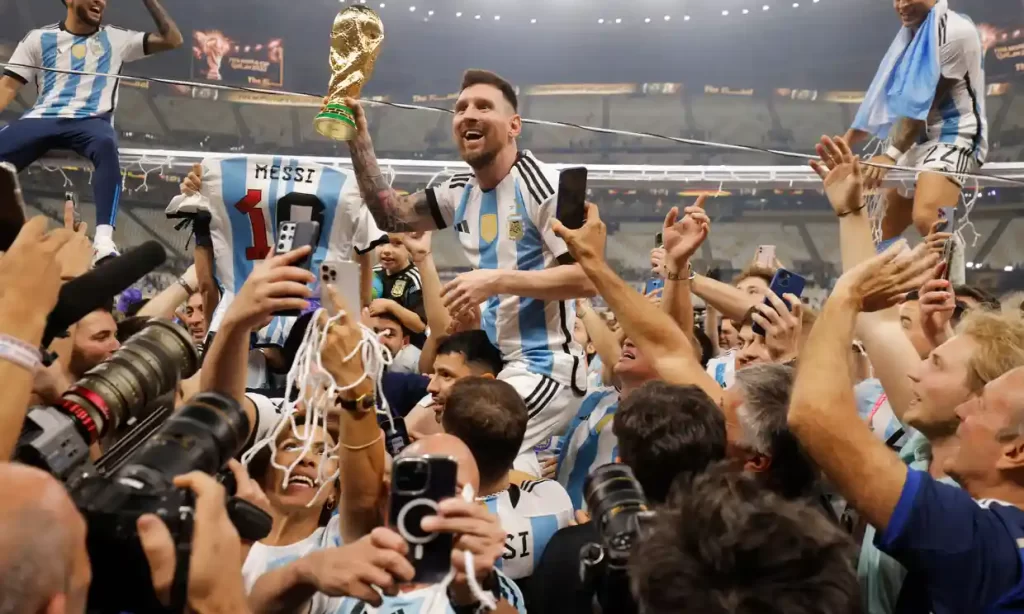It was a consecration, the spiritual overtones entirely appropriate. Lionel Messi not only emulated the deity of Argentinian football, Diego Maradona, by leading the nation to World Cup glory; he finally plugged the burning gap on his CV, winning the one title that has eluded him – at the fifth time of asking, surely the last time. In the process he gilded his claim to being recognised as the greatest player of them all.
Argentina had to win this final three times, France refusing to accept it was Messi’s destiny to get his hands on the iconic gold trophy, that it was somehow preordained. It will go down as surely the finest World Cup final of all time, the most pulsating, one of the greatest games in history because of how Kylian Mbappé hauled France up off the canvas towards the end of normal time.
It had been billed as Messi v Mbappe, the Argentinian hero opening the scoring from the penalty spot and having a hand in Ángel Di María’s goal for 2-0. But then came Mbappé, shattering the notion that Argentina would close out the win with the minimum of fuss. This Argentina team do not really operate like that. They love to trade in late drama. Think of their wins over Australia and the Netherlands in the knockout rounds.
A part of the story was France’s champion courage, the 2018 winners being revived by a clutch of Didier Deschamps substitutions. That and Mbappé, who was unplayable from the 80th minute. He scored twice in 97 seconds to force extra-time; the first a penalty, the second a sublime side-on volley and there was a point towards the end of regulation time when he appeared hell-bent on making sure that the additional period would not be needed.
Back came Argentina in extra-time, Messi scoring his second for 3-2. But back came France, Mbappé equalising with a second penalty on 118 minutes for his hat-trick and the Golden Boot. He finished the tournament with eight – one more than Messi. He joined Sir Geoff Hurst as a hat-trick scorer in the men’s final.
At this point it is worth delving into the mayhem that gripped at the very end of extra-time.
Neither team were ready to accept that a penalty shootout was inevitable. Not a bit of it. Randal Kolo Muani, on as a substitute for the game of his life, could not stretch to head home a cross byMbappé and will have nightmares about the one-on-one that he failed to convert, the Argentina goalkeeper, Emiliano Martínez, coming out on top.
So to penalties and, after Mbappé and Messi had scored, it was over to Emiliano Martínez and some of his dark arts to make the difference. After he had saved from the substitute Kingsley Coman, Martínez threw the ball away before the next France kick, forcing the 22-year-old Aurélien Tchouaméni to go and fetch it, further heightening his anxiety. Tchouaméni dragged his kick past the post.
Martínez had to be physically restrained by the referee, Szymon Marciniak, from confronting France’s next taker, Kolo Muani. Martínez was booked; Kolo Muani lashed home. But the scene was set for the substitute Gonzalo Montiel to win it – to crown Messi and Argentina.
When Montiel scored, Messi sank to his knees in the centre circle, engulfed by teammates. Argentina’s third World Cup will go down as Messi’s World Cup, just as the second in 1986 had belonged to Maradona. Both men came to transcend their teams and the tournaments, with Messi collecting the Golden Ball here as the competition’s star player. It has long felt as if he has had a celestial scriptwriter at work, guiding him to his destiny. The image of him and the trophy was what so many fans – and not just those from Argentina – had craved.
The start of the game came to feel like an awfully long time ago. It was when Messi located his passing rhythms straight away and Di María dazzled. Di María won the opening penalty, exploding away from Ousmane Dembélé before being caught and Messi did the rest.
The first half was all Argentina, a scintillating period for them, Messi seemingly playing his own game. He fizzed or curled his passes, wowed with his changes of direction. He even threw himself into challenges.
Di María had lifted high early on and it said everything about France’s struggles that Deschamps made a double substitution in the 41st minute. He moved Mbappé from the left into the centre and Olivier Giroud was the furious fall guy. Dembélé was also withdrawn. On came Kolo Muani and Marcus Thuram. By then it was 2-0. Messi fired a flowing move with a flick to Julián Álvarez, who immediately got Alexis Mac Allister running. Di María took off, too, on the other side and Mac Allister’s low crossfield ball was made to measure. Di María was overcome after his emphatic finish.
Then everything changed. Deschamps’ substitutions were acts of alchemy. He introduced Coman for the disappointing Antoine Griezmann and went to 4-4-2, Kolo Muani moving up alongside Mbappe.
It was Kolo Muani who won France’s first penalty from Nicolás Otamendi and suddenly Argentina were overtaken by nerves. The equaliser for 2-2 followed Coman robbing Messi and Mbappé finessing a give-and-go with Thuram before finishing spectacularly. The France substitutes streamed across the pitch towards Mbappé and France went close to a winner in regulation time, with Mbappé now rampant. At the other end, though, they needed Hugo Lloris to tip over a Messi blast to force extra-time.
Argentina shook their heads clear in extra-time. Lautaro Martínez made a difference. Twice he was denied by last-ditch Dayot Upamecano interventions and, when he unloaded for goal and Lloris could only parry, there was Messi to get the ball over the line.
There would be further twists, including Mbappé’s second penalty for a Montiel handball before Messi and Argentina could celebrate.
Source: The Guardian


